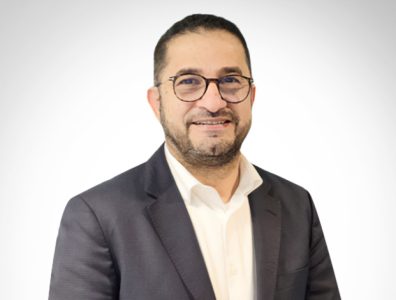
Alaeddine Karim, Microsoft’s country general manager in Kuwait, talks to The Energy Year about deploying a regional data centre and AI cluster in Kuwait and the company’s partnership with the Kuwaiti government for digital transformation. Microsoft creates platforms and tools powered by AI to deliver innovative solutions.
How does Microsoft assess the evolution of Kuwait’s economic and technological landscape?
Kuwait’s economy is reliant on government spending in infrastructure and oil and gas operations, so any innovation that boosts efficiency in these sectors is quickly noticed. Microsoft, traditionally an IT company, has significantly expanded its scope over the past decade with the rise of cloud computing. Today, our focus is on intelligent cloud technologies that not only increase productivity but help transform business models entirely.
With AI, we are seeing yet another evolution. The Microsoft Azure cloud helps clients deliver better customer experiences and generate new revenue streams. We are just beginning with AI, and within five years, we expect it to fundamentally reshape operations across sectors. Kuwait is also following this trajectory and understands the opportunity it presents.
Will the growth of data centre capacity increase Kuwait’s appeal among foreign investors?
Microsoft’s decision to establish an AI-powered Azure Region in Kuwait, backed by a multi-billion-dollar investment from both Kuwait’s government and Microsoft, sends a powerful message. It signals that Kuwait is ready for innovation and is serious about digital transformation.
This will catalyse broad economic benefits for a range of Kuwaiti companies, from startups to multinationals. KDIPA [Kuwait Direct Investment Promotion Authority] is promoting the growth of the ecosystem, and our partnership with Kuwait will support the country’s economic diversification efforts in a significant way.
The Kuwait Investment Authority (KIA) just joined your AI Infrastructure Partnership with BlackRock, Global Infrastructure Partners and MGX. How will this affect Kuwait’s AI ambitions?
The AI Infrastructure Partnership was formed with strategic foresight. It focuses on AI infrastructure investments, including chip manufacturing. As a top sovereign wealth fund, KIA brings weight to the group. By joining leaders in investment and tech, Kuwait is establishing itself as a key global player in the AI economy. It is a long-term, high-impact move that enhances Kuwait’s technological stature.
What is your current engagement with Kuwait’s oil and gas sector on AI and digital transformation?
Kuwait is positioning itself at the forefront of digital transformation in the region, with a strong emphasis on AI and digital technologies. Our engagement with Kuwait’s oil and gas sector in this space is multifaceted and deeply integrated into the country’s broader vision for technological advancement.
This commitment is reflected in various initiatives and partnerships aimed at enhancing the country’s infrastructure and capabilities. One of the key initiatives is the establishment of an AI-powered Azure Region in Kuwait. This monumental step is part of Kuwait’s digital and AI transformation journey, aiming to create a foundation for an AI-first economy. Our engagement with Kuwait’s oil and gas sector is part of this broader strategy, leveraging AI to drive efficiency, innovation, and economic growth across the industry.
Are the K-companies in Kuwait embracing digital transformation and AI?
Throughout the discussions and workshops we had with the sector’s leadership, we have witnessed an unwavering commitment to embrace transformation and innovation. We have seen bureaucratic hurdles being removed, and resources are being allocated. Everyone understands AI’s potential.
Unlike previous technologies, the value of AI is immediately clear. It is no longer about minor productivity boosts; some operations can no longer function effectively without it. This recognition is accelerating adoption across the board.
Kuwait has the opportunity to lead through rapid transformation. By taking appropriate measures, the country will not only continue to export oil but also share expertise on innovations that have enhanced the management of its national energy industry. There is no better time or opportunity than now, and Kuwait is well-positioned to accomplish this goal.
Can you comment on your partnerships in Kuwait beyond oil and gas?
Microsoft is first and foremost a partner organisation, and collaboration with local partners has enabled hybrid cloud services to launch before our regional data centres go live. We will continue expanding the ecosystem in Kuwait, one of the most robust in the region, to deliver tech solutions for multiple industries.
Our long-term partnerships with various government institutions have set the foundation for a safer, more connected and AI-powered future for Kuwait. For instance, the collaboration with CAIT [Central Agency for Information Technology] on the Tamkeen IT assessment initiative focuses on cybersecurity, infrastructure and application modernisation.
Looking ahead, we are committed to supporting Kuwait’s vision of becoming a hub for AI development in the Middle East. This includes fostering local innovation, enhancing public sector digitalisation and ensuring that AI technologies deployed in Kuwait align with global best practices in AI ethics, security and data privacy.
What kind of growth is Microsoft seeing in Kuwait?
Microsoft has been operating in Kuwait for more than 25 years, supporting public and private sector organisations across various industries. During this time, Microsoft has been observing significant economic growth in the country, driven by strategic partnerships, AI and digital transformation initiatives.
We are optimistic about the growth of both Microsoft’s business and the broader economy, as we are focusing on building the AI-powered Azure Region, launching our AI centre of excellence and driving digital transformation across the private and public sectors. Most importantly, Microsoft is supporting the skilling of the population in Kuwait, ensuring that individuals are equipped with the necessary skills to thrive in the era of AI and digital transformation.
To this end, we will be launching our Copilot Center of Excellence to support government transformation and introduce a new way of productivity. This will not only help increase efficiency but also equip public sector workers with the necessary, cutting-edge skills to deliver superior and innovative public services.
Source: Theenergyyear.com
